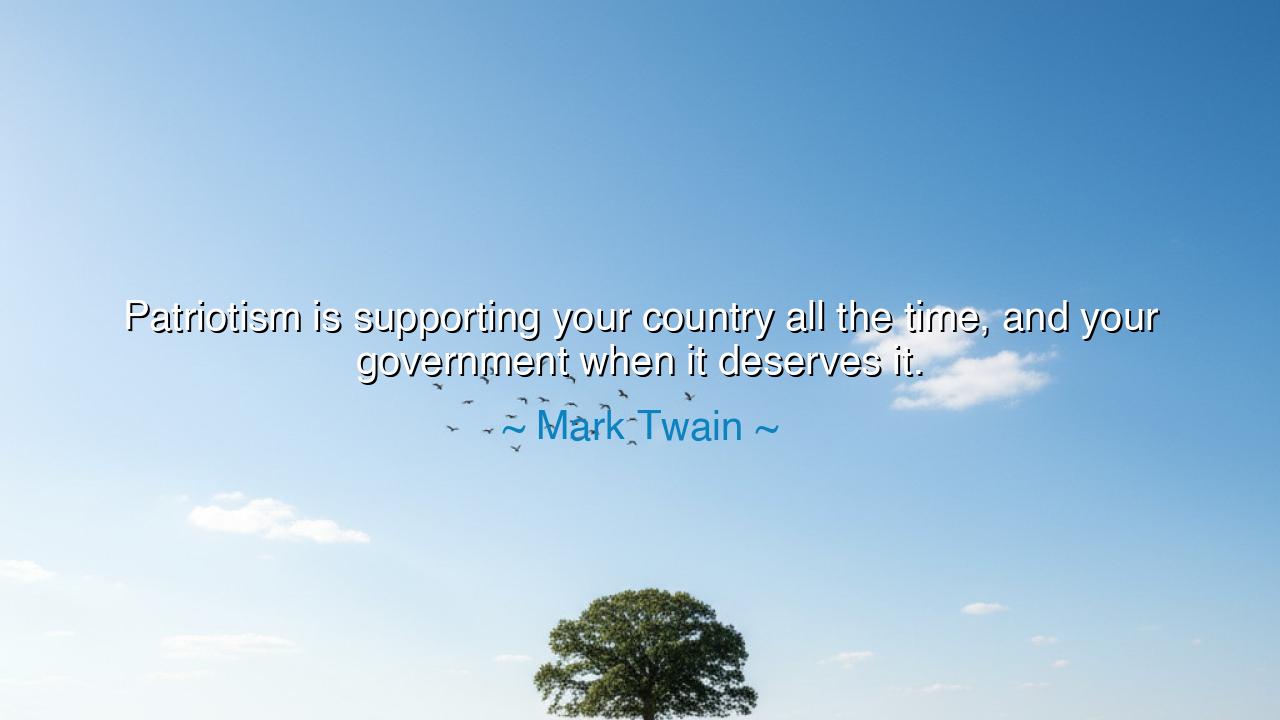
Patriotism is supporting your country all the time, and your
Patriotism is supporting your country all the time, and your government when it deserves it.






In the voice of the eternal sage, Mark Twain, there rings a truth both sharp and noble: “Patriotism is supporting your country all the time, and your government when it deserves it.” These words, though born from the pen of humor, strike like the hammer of wisdom upon the anvil of conscience. Twain, that great American observer of folly and virtue alike, saw the dangerous confusion that often dwells in the hearts of men — the mistaking of government for country, of authority for love, of obedience for loyalty. His quote stands not as a jest, but as a commandment to all free souls: to love one’s country unconditionally, but to grant allegiance to its government only when it serves truth, justice, and the people themselves.
The origin of this wisdom lies in Twain’s own age — a time of change, turmoil, and growing skepticism. He had seen the gilded surface of America, glittering with prosperity, but beneath it, he saw corruption, greed, and hypocrisy. The nation he loved was pure in its ideals but stained by the conduct of those who ruled it. Having lived through the Civil War, through imperial ventures abroad, and through the rise of political deception at home, Twain learned the difference between blind loyalty and enlightened patriotism. He spoke not to condemn love of country, but to purify it — to separate the eternal spirit of the nation from the temporary hands that govern it.
True patriotism, as Twain understood, is a sacred love — not of flags or slogans, but of the soil, the people, the principles upon which a nation stands. The country is the mother, eternal and deserving of devotion; the government is the servant, mortal and deserving only of judgment. To support one’s country “all the time” is to uphold its ideals even when they are betrayed by those in power. To support one’s government “when it deserves it” is to keep watch like a sentinel, guarding freedom from those who might corrupt it in the name of authority.
History offers many witnesses to this truth. Consider the story of Mahatma Gandhi, who loved India with every fiber of his being, yet resisted the British government that ruled over her. His was not rebellion born of hatred, but of love — love of country, of truth, of human dignity. He obeyed the call of conscience above the command of empire. Likewise, in the land of Twain himself, the American Revolution was not a revolt against England the nation, but against the government that had become deaf to justice. In both cases, the truest patriots were those who dared to disobey — who saw that allegiance to freedom is higher than allegiance to power.
Twain’s words also carry a warning. When patriotism becomes blind, it becomes dangerous. Those who cry “My country, right or wrong!” forget that to love one’s homeland is not to justify its sins, but to call it back to righteousness. When the government acts unjustly — when it wages war without cause, silences truth, or oppresses its own people — then the silence of citizens becomes complicity. The false patriot worships authority; the true patriot holds it accountable. As Twain himself once said elsewhere, “Loyalty to the country always. Loyalty to the government when it deserves it.”
Yet his teaching is not a call to rebellion, but to wisdom. For there are times when the government does deserve our loyalty — when it acts in the spirit of liberty, protects the weak, and pursues justice without fear or favor. Then, the duty of the patriot is not merely to criticize, but to defend. Love of country must be steadfast, but love of truth must be greater still. The highest form of patriotism is not found in shouting one’s loyalty, but in living it — through courage, integrity, and service.
The lesson, then, is timeless and clear: let your love of country be constant, but let your trust in government be earned. Question authority, for questioning is the breath of freedom. Speak truth, even when silence is safer. And remember that your country is not its rulers — it is its people, its principles, its enduring dream. The patriot defends not the throne, but the promise. The flag is but a symbol; the spirit behind it is eternal.
So, my child of the republic, carry Twain’s words as a lamp within your heart. Love your land as you love your own blood — fiercely, selflessly, endlessly. But when those who govern betray that love, stand as its defender, not their servant. For the truest patriot is not the one who bows to power, but the one who kneels to conscience, and rises for the truth. Only then can a nation be both free and worthy of the devotion of its children.






AAdministratorAdministrator
Welcome, honored guests. Please leave a comment, we will respond soon